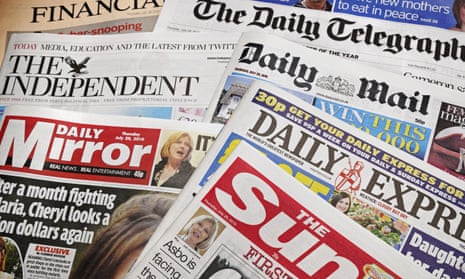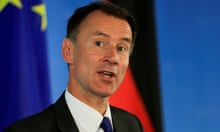The government is facing two difficult votes, and potential defeats, over amendments to the data protection bill that are due to be debated in the Commons on Wednesday.
The amendments would establish a “Leveson two” inquiry into the misuse of personal data by the media, and a measure that would impose punitive legal costs on English media organisations that refuse to sign-up to an officially recognised press regulator. At present, the only such regulator is Impress.
The second amendment, tabled by the Labour MPs Tom Watson and Liam Byrne, has prompted a robust response from media organisations who fear it would have a chilling effect on investigative journalism in the public interest.
Under their proposal, publishers who had not signed up to Impress would be forced to pay the legal costs of claimants who brought legal proceedings against a news outlet, even if the publisher won the case.
Theresa May told cabinet ministers on Tuesday morning that the plans would undermine the free press and it was “very important” that the government oppose the amendments. She said the government remained committed to a voluntary system of independent press regulation.
Guardian News & Media, the owner of the Guardian and the Observer, has written to all MPs, warning that the proposed amendment on section 40 would “further erode press freedom and have a severe chilling effect”.
GNM also said it rejected a plan, contained in the proposal tabled by Watson and Byrne, that would exempt media organisations which reinvest their profits back into journalism from paying punitive legal costs.
It appeared that GNM would effectively be the only media organisation to benefit from this proposal.
“This clause was not discussed with Guardian News & Media and we disagree with attempts to impose a selective sanction on the media,” the publisher told MPs in a briefing note.
“We do not believe that singling out one model of ownership for news organisations in this way is a constructive approach. This amendment implies that just one ownership model can result in the production of high quality journalism, which is simply not correct.”
Following a weekend of press reports suggesting GNM would benefit from the proposals, Watson attempted to clarify his position by saying the clause was never meant to capture the publisher.
“The Guardian is not covered by this exemption and that was never the intention,” a Labour spokesperson said. “The exemption is for independent local newspapers and not-for-profit organisations.”
The proposal for a fresh Leveson-style public inquiry into the activities of media companies is contained in an amendment to the data protection bill tabled by a cross-party group of MPs, including Labour’s Ed Miliband and the Conservative Ken Clarke.
The original Leveson inquiry, which began in 2011 following the phone-hacking scandal, was always meant to include two parts. The first part, which investigated the culture and ethics of the press, was completed, but earlier this year the government confirmed it would not push ahead with the second part, which was due to focus on relationships between the media and the police.
Miliband and Clarke’s amendment would require the government to establish another inquiry, with a mandate that echoes the original plan for Leveson part two while also expanding the scope to include social media companies.
Among other issues, the new inquiry would be mandated to investigate unlawful use of data by large media publishers, consider whether there should be reporting restrictions on police investigations where no charges have been brought, and investigate the role of social media companies, such as Facebook and Twitter, in spreading dubious information.
Labour and government sources said they expected the votes to be tight, with Conservatives more minded to back Clarke’s call for a new inquiry than vote for Watson’s proposal to impose punitive costs on publishers.
The prime minister’s official spokesman said: “We have set out the importance of these votes and of the government resisting those amendments and we would hope that when MPs come to consider these amendments, they will look at the strength of the case we’ve put forward.”
However, Downing Street sources said they were bracing themselves for a defeat on the inquiry amendment. “It’s going to be really difficult,” one said. And they believed the vote on punitive costs was going to be “tight”, with questions remaining over how the Democratic Unionist party will vote and whether some Tories might abstain.
The sources said they were aware of a handful of Tory MPs who were planning to rebel against the three-line whip, with Clarke leading the charge. Whips were concentrating on persuading backbenchers who had indicated they would abstain to vote against the amendments instead.
The Scottish National party’s 35-strong Westminster group was meeting late on Tuesday to decide how to vote. The party has previously ruled out forcing the Scottish press to sign up to a state-approved regulator.
The prime minister’s spokesman said: “Almost £50m of public money has already been spent on investigating phone-hacking, and establishing a further public inquiry requiring great time and expense is not a proportionate solution to allegations which have already been the subject of several extensive police investigations or ongoing investigations by the Information Commissioner’s Office.”










